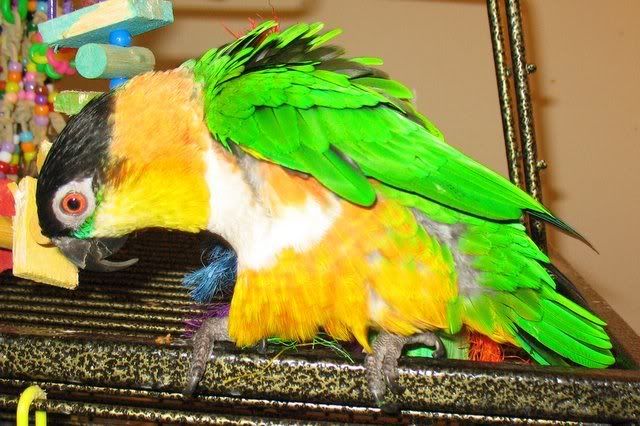I have an African grey, a blue and gold macaw, and a lovebird. I'm headed to Iowa for school in a couple weeks and am taking in a double yellow headed amazon (hoping it is just fostering for the couple who just had a baby and aren't managing well) after I get there. Do you have any advice for adding another bird to your flock? My grey plucks feathers when my schedule changes so I'm a bit worried about him, but my other two seem to just go with the flow.First, I saw a picture of Sunny (the double yellow headed amazon referenced above) when I went over to Brittany's site to link to her, and he is absolutely gorgeous! Also, time for a confession: I LOVE amazons! They have such amazing personalities. They are flamboyant and let you know exactly how they feel. Don't tell my parrots, but I am currently having an extra-flock relationship with an amazon at the rescue where I volunteer and he has rekindled my love of these amazing creatures (also with a severe macaw, though I have mentioned him on the blog before)!
Brittany, you are in for a fun adventure! I must also add that, more than any other species of parrot, amazons are surrendered to the rescue due to new babies. Brittany, I hope for your sake that it does turn out to be just a foster (if that's what you want), but given my experiences, I wouldn't be surprised if it turns out to not be temporary.
Of course, every bird is an individual, but I will be making some species generalizations that I have observed during my years at the rescue.
First, of course, is the issue of the new bird's health. Since Brittany is a vet student, I'm mentioning this more for anyone who stumbles upon this, but you want to make sure that the new bird is healthy and won't infect your flock with anything contagious. Doing a quarantine in your house is ideal, but not always possible. In any case, you want to get the new bird to an avian vet as soon as possible for a check-up and to make sure they are healthy.
Second, especially in cases with mixed-sized flocks, is to be very aware of the damage that birds can do to each other. Once again, Brittany is already aware of this due to her experience and having a small, medium, and large bird in her house already, so this is more for other people who may find this. I have known of many cases where a beak or toe has been ripped off by another bird, sometimes resulting in death. It is very important to closely supervise because it only takes a second for something to happen.
Now, on to the fun stuff! The biggest thing I've learned through integrating birds into my flock is to watch the bird's body language and don't try to push them too far, too fast.
Generally, this shouldn't be as big of a problem with an amazon as it is with a grey. I wish I'd had this blog when I introduced Rocky and the caiques to our house to have as a comparison with Stella's and Steve's introductions. From what I can recall, Rocky was strutting around like he owned the place less than a week after coming home, and the caiques also quickly adapted.
At the rescue, many times amazons are talking and singing and begging for attention within a day or two of arrival, whereas the greys tend to open up only to certain people, and it takes them longer to do so.
In addition to watching body language, try to make yourself as valuable to the new bird as you can. That's what we're doing with Steve right now. I keep his favorite foods (pistachios, cashews, peanut butter, peas, apples) out of his food dish. He gets them directly from me, so that he starts to associate me with good things. It's a way to build trust.
Parrots are very empathetic and pick up on our body language. I try my best to never be angry or worried in front of my parrots, but especially not in front of a new bird with whom I haven't yet had time to build trust.
One of the great things about amazons is how expressive they are! Over the years, I've interacted with over a hundred amazon parrots, and they just can't hide their feelings. This is great because you get instant feedback if you're pushing the bird beyond its comfort zone, and it makes it much less likely for you to get bit as long as you heed the warnings!
I'm not sure if anything I've written will be helpful, Brittany, since you have so much experience already. Just watch Sunny, follow his cues, and you'll do great. I can't wait to see your progress on your blog!
Oh, and that amazon smell, and the way they dance, and their ecstatic reaction when showered, I could go on and on...


1 comment:
Thanks for the advice. I know I'm pretty experienced but it never hurts to get all the input you can when you are going into uncharted waters. I'm pretty sure it will not be a temporary home (that is exactly what happened with Sine, my lovebird who I got 7 years ago?) but I'm keeping my hopes up his original family will be able to take him back sometime. Until then he'll be joining my other feathered kids.
Post a Comment